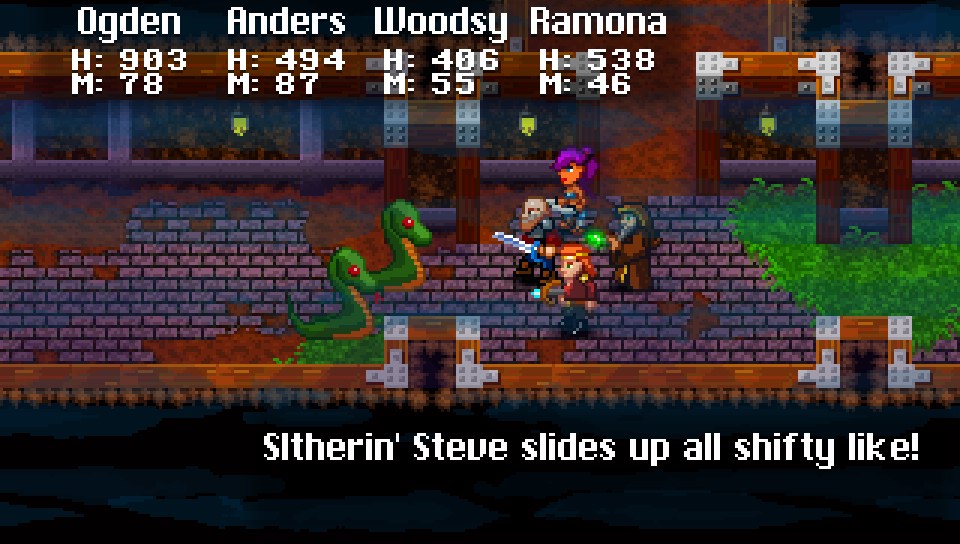Dragon Fantasy Book II is a game about doing the same thing over and over until the credits roll, and overcoming challenges using the same tired techniques. Repetition is not an occasional roadblock, but rather, the beginning, middle, and end of the game experience. While the script is pun-packed and, at times, laugh-out-loud funny, Book II is a 15-hour exercise in button tapping.

Book II's visuals and sounds are clearly inspired by classic 16-bit-era role-playing games. The main character, Ogden, is the returning protagonist from Dragon Fantasy Book I. He's bald, overweight, and past his prime fighting years. He and a small group of heroes must band together to defeat an ultimate evil. This story has, of course, been done to death; if developer Muteki hadn't loaded the script with cute jokes and chuckle-worthy dialogue, you could skip all the text without missing much. It's a welcome and entertaining alternative to typical, self-important fantasy blabber. Plus, the silliness means you get to fight off-brand Daleks and groups of David Bowelfs.
Everything about Book II, including combat, is light and free of consequence. The turn-based fights rarely last longer than a minute, and there are no random encounters. Instead, you view enemies in the environment, and you can avoid them with some maneuvering. If you choose to fight, you usually just unleash your standard attacks until the other dudes fall over without worrying about other battle options. Beefier enemies might require you to use your healing spells during a skirmish, but even when you're up against a strong opponent, combat is never tense or challenging. When combat is over, you patch up your party using dozens of cheap healing items. This is the boring core gameplay circle of Book II, and it doesn't change.
The worst part is that Book II clearly had plans to be something better. As you level up--which is a quick, almost effortless process--you learn a wide variety of skills with different effects and uses. Rare items are found in chests. Crafting manuals can be purchased. Superficially, the game aims to expand your options. However, when your basic skills do the job just fine most of the time, there's little reason to try anything else. There are a few instances of ship-to-ship combat, which could have provided some sorely needed diversity, but they're entirely forgettable. Ammunition, in the form of rock monsters, must be battled, defeated, and carried to your ship's cannons. It feels like busywork that keeps you from getting to where you really want to go.
For a good chunk of the story, your main cast is split up. This could have been a fine way to give you three interesting sides of one story, as well as three different play styles. Unfortunately, the stories aren't connected in a meaningful way, and the wayward characters have more or less the same kinds of skills. There's a way to capture monsters and have them fight for you, so you'll be using random creatures to fill out your party most of the time. Aside from having funny names and appearances, most have the same few attacks. Rather than choosing party members based on their combat capabilities, you'll probably end up picking them based on how they look.

Extra quests are plentiful, but they're difficult to manage and often not worth the trouble. Finding lost items and killing bad guys are the most common tasks. After completing a quest, your log tells you which city to return to but doesn't specify who gave the quest. With so many active assignments, you'll almost certainly forget whom to speak with, which means you have to talk to everyone in the city until you find the character you're looking for. Rewards are usually meager anyway. You'll find plenty of experience and goodies on the main story path.
Book II's technical issues are annoying and abundant. The frame rate often drops in environments with weather or atmospheric effects. Full game crashes are common, especially when you're swapping out party members. These problems are worsened by the game's lack of an autosave system. The anxiety you feel when exploring a dungeon doesn't come from the challenges you face; it comes from suddenly realizing that you haven't saved in 20 minutes, and that a crash could easily wipe away the few levels of progress you made. These flaws dictate the pacing. You'll stop and save often when you otherwise wouldn't need to.
With Dragon Fantasy Book II's bare-bones combat and rampant technical issues, your appreciation of the game will boil down to how much you enjoy puns. The framework is in place for a bigger, more engaging game, but there's just no reason to move beyond the basics. Don't be fooled by its appearances: this classic-looking RPG gets nowhere close to filling the shoes of its inspirations.